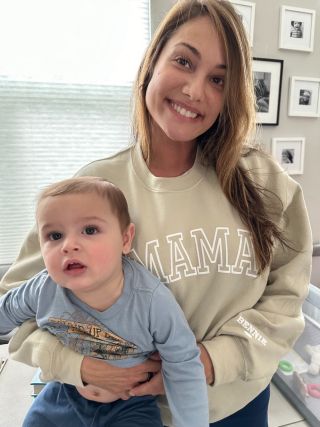
Work in Progress
Source: Anna David
When you become a mom decades after most of your friends, you have, well, decades to hear all the judgments—the “can you believe she…?” about every mom you’ve ever heard of.
And so I went into parenting with a bunch of voices I was just going to ignore so I could do what felt natural. Then, when my son Bennie was about 6 months old, I wanted more than the Instagram videos my eavesdropping phone was feeding me: I wanted a parenting class.
Which Class to Choose?
You don’t have to delve too deep into Reddit message boards to glean the fact that modes of parenting are controversial.
Authoritarian, authoritative, permissive, or neglectful? Reggio, Emilia, Waldorf, RIE, or Montessori?
Without a clue and not sure which method would be best, I let fate decide: when two parents I knew recommended RIE (otherwise known as Resources for Infant Education), that’s the direction I went.
RIE and Recovery
There’s another reason RIE felt like fate. I’ve been in recovery from addiction for over 20 years and active in 12-step the entire time.
When I couldn’t find a Saturday morning meeting I liked in LA, I decided to create one. Eight years later, the meeting is still going, though due to circumstances beyond my control (businesses going under, rent getting too high, and a pandemic), we’ve been in a bunch of different locations.
The location we’ve been in the past few years happens to be down the hall from one of the places where LA RIE classes are held.
This means that for years, as I’ve settled into my 12-step folding chair, I’ve seen parents of adorable babies wheel and carry those babies down the hall to the RIE room.
Occasionally, during a meeting bathroom break, I’d pass their classroom, where they often looked like they were doing a whole lot of nothing.
I Was Right: Sometimes They Were Doing Nothing
The RIE way is all about teaching children to be independent. It’s about not labeling them or their emotions—not rushing over when they hurt themselves, not even assuming they’re hurt until they show you that they are.
It’s about modeling behavior—cleaning up at the end of the day in front of them so that they eventually learn to help, saying “please” and “thank you” rather than nagging your kid to say it and essentially doing a whole bunch of things that feel contrary to what I’ve always heard you’re supposed to do as a parent.
And sometimes it’s about doing nothing. A lot of the 90-minute class is spent letting the kids play with the non-battery-operated toys in the room while we sit against the wall and ask our teacher questions. We even have quiet time, something I haven’t experienced since I was a child, where we watch our kids play.
Doing Nothing Is Kind of Nice
The “doing nothing” vibe is probably one of the main reasons I’ve stuck with the class. (A lot of my Mommy classes have been one-offs after I realized they weren’t for me, from a stroller workout to an “art class” where Bennie had to stay in his crib while I decorated a Stanley cup.)
It’s soothing to chat about parenting while your kid does his thing. I don’t have the patience to sit at home for an hour-and-a-half and just watch him play without doing anything else and I can’t imagine I’d have the patience to sit in a 90-minute class listening to a lecture. It’s what I wish actual school had been—discussing and experiencing rather than taking notes and tests.
Here’s the Recovery and RIE Crossover
Experiential learning does, however, have its drawbacks—for instance, I walk out of the room often not remembering any of the dozens of things I learned that day. And since a lot of what I’m learning is so contrary to what the world tells you about how to parent, I often only remember something I learned when I’m not doing it later.
Parenting Essential Reads
Twelve-step recovery is similar. I sit in meetings and hear brilliant things—life-changing philosophies and experiences that my fellow trudgers share. Then I forget most of them.
The best things I hear in recovery usually only occur to me when I’m frustrated—determined not to let the obnoxious driver trying to get in my lane when I remember someone in a meeting saying, “If you let them go in front of you, you can never get cut off” or feeling a pang of jealousy of someone on social media before remembering someone in a meeting sharing about how to stop comparing and despairing.
I’m a lot newer to parenting than I am to recovery and that makes much of what I learn even harder to remember. But I’m not the only one with the built-in forgetter. Two of my classmates and I have actually started a text chain so we can recap the things we remember from class that day. I transfer those to a Notes app on my computer, hoping that will help these learnings become intrinsic.
Is it working? Well, my 14-month-old seems to be thriving, and maybe even his parents, too. But who knows? As I’ve learned over and over again, it really is just one day at a time.

